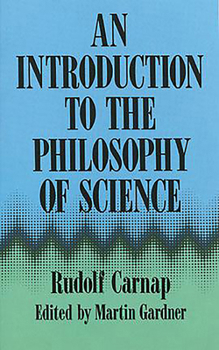An Introduction to the Philosophy of Science
Select Format
Select Condition 
Book Overview
One of the most creative philosophers of the 20th century, Rudolf Carnap presented a series of science lectures at the University of California in 1958. The present volume is an outgrowth of that seminar, which dealt with the philosophical foundations of physics. Edited by Martin Gardner from transcripts of Carnap's classroom lectures and discussions, the book remains one of the clearest and soundest introductions to the philosophy of science.
Specially designed to appeal to a wide range of readers, An Introduction to thePhilosophy of Science offers accessible coverage of such topics as laws and probability, measurement and quantitative language, the structure of space, causality and determinism, theoretical laws and concepts and much more. Stimulating and thought-provoking, the text will be of interest to philosophers, scientists and anyone interested in logical analysis of the concepts, statements and theories of science. Its clear and readable style help make it "the best book available for the intelligent reader who wants to gain some insight into the nature of contemporary philosophy of science" ― Choice. Foreword to the Basic Books Paperback Edition, 1974 (Gardner); Preface (Carnap); Foreword to the Dover Edition (Gardner). 35 black-and-white illustrations. Bibliography.
Customer Reviews
Rated 4 starsReview by LP
A cultural cornerstone. Must be read by those who are interested in science and its history.
0Report
Rated 5 starsNot only for specialists
The value of this book is that it contains a summary of the views of Carnap in his last years, but it is readable not only for specialists. The "introduction" really menas that it is not so technical. You may read this book if you are interested in special relativity and some philosophy, or if you are curious about the scientific method and like to think abot it.
0Report
Rated 5 starsA unique product of a unique collaberation
Is this book still relevant, despite being a bit old? The answer isan unqualified YES. Why is this book the best introduction to thephilosophy of science ever written? Because it is the result of acollaberation between Rudolf Carnap (a philosophical giant) and MartinGardner--the celebrated columnest who gave us so many years of"Mathematical games," during Scientific American's golden years.Because it was co-written by a...
0Report
Rated 5 starsa great introduction to the philosophy of science
This is perhaps the only book in which Carnap is almost invariably informal. It is a remarkably clear introduction to some important topics in the philosophy of science: the nature of scientific laws, probability, scientific measurement, the structure of space, causality and determinism, theoretical concepts and laws, and a last chapter called "beyond determinism". The point where Carnap gets a bit formal, sections 26-28,...
1Report
Rated 5 starsexcellent read on why Science works the way it does
This is probably the clearest account of the way Science works and why certain decisions are made. Within it is contained the clearest explanation of portions of General Relativity (as a concrete example of why Einstein presented the theory in the manner he did) I've ever read, as well as many other little interesting tidbits. Some parts of the book are a bit dry, but that is probably because this book is a rewriting of...
0Report













